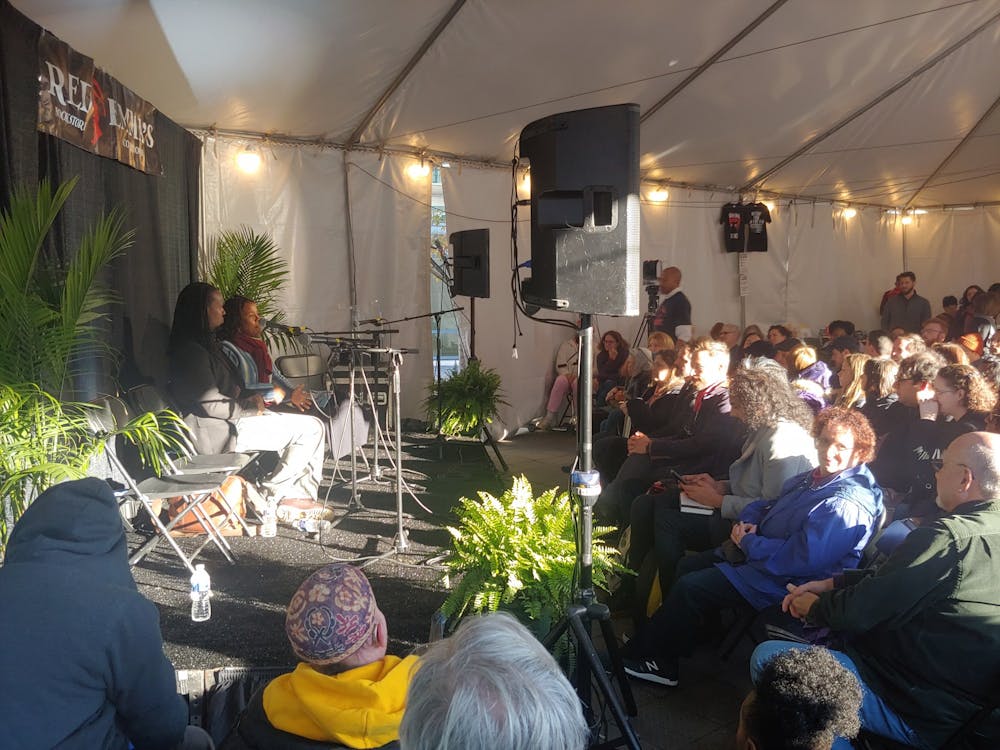The Baltimore Book Festival, an annual celebration of literary work in Maryland, took place on Nov. 1-10. Baltimoreans lined up at Inner Harbor to attend talks, book signings, bookseller tents and readings by various authors on a plethora of topics: from social justice activism, science fiction and romanticism to children’s classics.
A particularly popular event was a talk by Ibram X. Kendi on Sunday, Nov. 3 about his new book How to Be an Antiracist. In the chilly weather, Baltimoreans packed into the outdoor pavilion tent, stood in the back and lined up on the perimeter to hear Kendi explain and challenge a number of perspectives on race and racism.
Kendi’s talk discussed topics from the role of racism in causing poverty and societal oppression to generational burdens impacting successful black people that break through stereotypes. The underlying common denominator between all the topics, however, was his emphasis on perspective and language, which is vital in critically assessing and challenging old schools of thought.
Kendi began with talking about two threads of racism that he believes need to be addressed and countered: segregationist and assimilationist.
“There are segregationist ideas that suggest that black people are like animals — that they are genetically or biologically inferior. That’s how people and historians commonly define racist ideas,” Kendi said. “But I argue there was another type of racist idea... that black people are not like animals; they are more like children. And that it’s our job as racial reformers to civilize and develop these children back to adults — adulthood being basically how white people act culturally or behaviorally.”
Kendi unpacked the definition of what it truly means to be racist, emphasizing the importance of understanding the profound impact of our language and elaborating on his choice of the term “antiracist” in his book title.
Because segregationists and assimilationists were self-identifying their ideas and themselves as not racist, he specifically chose the term “antiracist” to address and challenge segregationist and assimilationist ideas.
Kendi described a fundamental flaw in most Americans’ beliefs on racism.
“Most Americans will swear that they are not racist. Then you ask them to swear again, and they will swear again from the bottom of their heart that they aren’t. But if you ask them very simply, ‘How do you define a racist?’ most Americans won’t know,” Kendi said. “The denial of racism itself is the heart of racism.”
Fifteen-year-old Jane Fox, one of the youngest attendees at the event, said her main motivation for attending was her mother, who was an avid reader of Kendi.
“My mom has been reading the book, and she really liked the author and what he had to say. So she offered me to take me, and I wanted to come along,” Fox said.
At the end of the talk, Fox said that the event expanded her understanding of racism significantly.
“I learned a lot about words and how everyone has different actions that can be racist and antiracist. I’m going to take that to my school and teach my friends and tell my teachers that they might want to read this book so we can have discussions about this,” Fox said.
Other attendees had different motivations that prompted their attendance. Caryn York, the chief executive officer for the Job Opportunities Task Force, enthusiastically waited in the book signing line, saying she loved Kendi’s work and wanted to support the Baltimore Book Festival as a native Baltimorean.
York said she hoped to apply Kendi’s principles in her public policy advocacy work and her efforts to help low-wage workers advance to better-paying jobs.
“I don’t think that it was anything new that I learned. It was more affirming of some things that I’ve been thinking and learning. [It] equipped me with additional language to better land my argument when I’m trying to make this case in certain spaces,” she said.
Kendi concluded the event and question-and-answer session with a call to action.
“I would never stand up and say that I am an antiracist.... In many ways, to be an American, is to be raised to be racist. In many ways, to be a racist is to be addicted. In order to overcome any addiction, it’s something you have to do on a daily basis. It’s much easier to remain addicted and deny you are addicted,” Kendi said. “At the same time, your nation is dying because of your addiction. It’s critical for each and every one of us to take... responsibility for transforming this country.”





